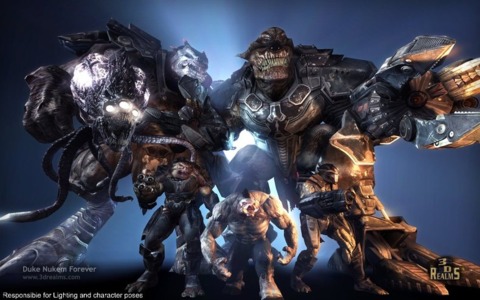Take-Two was developing new Duke Nukem for '10 - Report
Legal documents from countersuit contend publisher had commissioned "well-known" third-party developer to make a new title called "Duke Begins"; project allegedly stopped this past April.
Like most legal battles, the courtroom struggle between Duke Nukem Forever developer 3D Realms and publisher Take-Two Interactive is progressing at a gradual pace. One month after Take-Two sued 3D Realms, the latter's parent company, Apogee Software Ltd., filed a countersuit on Friday in the US District Court of Southern New York, which was spotted by GamePolitics. (The company also uses the Apogee name for its handheld and classic game division, relaunched in 2008.) Besides denying most of the initial suit's claims, the new filing also revealed that Take-Two was working on its own new Duke Nukem game.
Though briefly mentioned in the main body of the suit, the game and its origins are best described in the background information at the 20-page filing's end. It says that as part of an October 22, 2007, agreement, "Apogee granted [Take-Two subsidiary] 2K Games the exclusive rights to develop and publish a new videogame based on Apogee's Duke Nukem franchise." Later on in the suit, the studio is identified as a "third-party" shop, not one of Take-Two internal studios.
According to Apogee's filing, the new game was given the working title of "Duke Begins," possibly hinting at a Batman Begins-style reboot or prequel. 2K Games had reportedly commissioned a "well-known game developer" to start work on the game within two months of the October 2007 filing, with Apogee retaining approval rights. A similar arrangement saw 3D Realms oversee Human Head Studios' development of the 2006 relaunch of Prey, published for the PC and Xbox 360 by 2K Games.
The suit says the original launch date for Duke Begins was mid-2010 under a development schedule approved by Apogee. The agreement would see royalties from the game be used to pay back a $2.5 million loan Take-Two made to Apogee to complete Duke Nukem Forever, which would presumably be released before Duke Begins. However, a clause in the agreement hinted that DNF--first announced in April 1997--could be released as late as October 2012 before Apogee would be forced to repay the loan.
However, Duke Begins was never to see the light of day. Apogee's suit contends that, "upon information and belief"--which is legalese for "as far as we know"--Take-Two "halted or otherwise canceled all development for by the third-party game developer on the Duke Begins game in April 2009." The company contends that any such move was done without its consent and has "materially harmed Apogee" due to loss of royalty revenue.

The October 2007 agreement also saw Take-Two relinquish publishing rights to both a Duke Nukem Forever sequel and a game based on a potential film based on the risque shooter series. However, the current legal impasse between the two companies stems from the fact that Take-Two holds the publishing rights for Duke Nukem Forever, preventing Apogee from taking it to another company. Since Apogee owns the Duke Nukem IP, Take-Two can't commission another studio to make a game without the developer's consent.
According to a May 18 statement from Apogee, Take-Two tried to buy the Duke Nukem IP outright earlier this year. However, according to the developer, "Take-Two's proposal was unacceptable to 3DR for many reasons, including no upfront money, no guaranteed minimum payment, and no guarantee to complete the DNF game."
Apogee's counterclaim also reveals that all the agreements were only for a PC version of Duke Nukem Forever. Until May 1, 2009, the companies were negotiating an agreement for Apogee to develop a 360 version of the game--which obviously fell through.
Finally, Apogee also laid out the blame for Duke Nukem Forever's 12-year development period. The culprits were "personnel changes over the years, software and hardware technology changes and upgrades, gameplay changes and enhancements, and switching from the Quake II engine to the Unreal engine during the project." Apogee contends, though, that the delays didn't matter, since "a completion date has never been set by either Apogee or Take-Two or otherwise contractually agreed between Apogee or Take-Two."
Why Are Video Game Adaptations Good Now? | Spot On Fallout 4 Next Gen Update Comparison Fallout 4 Steam Deck Verified Gameplay ALIEN: Rogue Incursion - Announcement Teaser Trailer Stellar Blade - 13 Things I Wish I Knew S.T.A.L.K.E.R. 2: Heart of Chornobyl — Official "Not a Paradise" Trailer Manor Lords - Official Medieval City Builder/RTS Launch Trailer Honkai: Star Rail - "Then Wake to Weep" | Version 2.2 Trailer Devil May Cry: Peak Of Combat | Dante: Blazing Tempest Gameplay Trailer SAND LAND — Official Launch Trailer Sea of Thieves Season 12: Official Content Update Video Stellar Blade - Hard Mode No Damage Gigas Boss Gameplay
Please enter your date of birth to view this video
By clicking 'enter', you agree to GameSpot's
Terms of Use and Privacy Policy
Got a news tip or want to contact us directly? Email news@gamespot.com

Join the conversation